After a very energising Mind Body Experience in the RDS Dublin in September 2024. Several important discussions around complex issues were discussed. Surprisingly a few people asked me about Iron Deficiency Anaemia (IDA) and the role of copper. This is a topic I have heard discussed previously and I wanted to address some specific questions from the session.
There are some very important clarifications
This blog is based of studies going back almost 100 years and the great work of Morley Robbins who is a big advocate of copper to iron balance.
As a Nutritional Therapist we never recommend iron supplementation unless it is verified deficiency through a blood test with the relevant makers being checked.
The symptoms of excess Iron are the same as low Iron, and in Western Europe 40% of men are predisposed to hemochromatosis (excess iron). Women during menstruation, lose blood, men do not have any mechanism to shift iron from the body, very small amounts are lost through the digestive wall and blood donation is the only way significant volume can be moved out of the body.
There are two type of Iron
Heme-Iron – Found in meat, the body absorbs this even if it is not required
Non-Heme Iron – Found in plants, the body will uptake this if required, it is a synergistic relationship
Vitamin C – Viatmin C increases the uptake of Iron by 25%
As a Nutritional Therapist this is our initial recommendation for low iron, use food sources and combine with Vitamin C. This is a very safe wand effective way to increase iron availability, especially when using non heme sources.
Okay so let’s discuss the copper relationship. The question presented to us at the MBE event in September 2024 was around continued IDA after clinically supervised Iron infusions.
This is where Morley’s work requires some serious consideration, we do not agree or disagree with his work but we do believe in the specific case outlined above it may be beneficial with some terms and conditions outlined below. Caution should always be taken if you are on medications.
The relationship between copper and iron metabolism has been studied for nearly a century. In 1928, researchers at the University of Wisconsin observed that rodents deprived of copper accumulated iron in their livers. This finding has been replicated in numerous studies. More recently, in 2021, genetic research by Kevin Gonzalez further elucidated the role of specific genes involved in copper and iron metabolism. These studies highlight the critical role of copper in regulating iron levels within the body
The following outlines the hypothesis
Copper deficiency can lead to iron deficiency through the following process:
Red Blood Cell Maturation: Red blood cells (RBCs) undergo a maturation process where they initially grow in size and then shrink to become healthy and effective.
Iron Exit Mechanism: For RBCs to shrink properly, iron needs to exit the red blood cell. This exit occurs through a specific pathway involving a doorway called “Ferroportin.”
Role of Copper: Copper is essential for the functioning of this iron doorway. It acts as a “doorman” that opens the Ferroportin pathway, allowing iron to leave the red blood cell.
Impact of Copper Deficiency: If there is a deficiency in copper, the “doorman” is not present to open the Ferroportin doorway. As a result, iron cannot exit the red blood cell.
Consequence on RBCs: Without the exit of iron, the red blood cells remain too large (high RDW – Red Blood Cell Distribution Width) and are not as effective.
Iron Deficiency: Since iron is trapped inside the red blood cells and cannot be utilized properly, this leads to a functional iron deficiency, even if there is enough iron present in the body.
Morley believes it is crucial to understand that what is often diagnosed as iron deficiency anemia may actually be a result of copper deficiency. Without adequate copper, iron cannot be properly regulated and utilized in the body, leading to symptoms that mimic iron deficiency anemia.
Food sources for copper include
- Beef Liver
- Oysters
- Chocolate
- Potatoes
- Shiitake mushrooms
- Crabs
Terms and conditions
Zinc can deplete copper so if you are taking a traditional Zinc capsule or tablet, ensure it is combined with copper, the better suppliers typically include copper with Zinc.
There are genetic mutations that can cause excess Copper build up (Wilson disease) as such we do not recommend copper supplementation and HIGHLY recommend you undertake any protocol under supervision.
Food sources should always be the first step.

Comments are closed